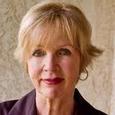After the death of someone we love our grief experience and overall healing has everything to do with our relationship to the deceased, the intensity and depth of the love we felt for them and our degree of faith in a hereafter. In the immediate aftermath of a person's death, it's hard to breathe and everything hurts. We feel shattered, bewildered and frightened. Sometimes, however, grief shows us its own timetable and can be delayed or complicated. I experienced a long delay in time sequence when my father died. I was thirteen years old; it was the springtime of my life.
I rarely spoke about him back then and it appeared that I was coping fine until my early 30's when my denied pain erupted on the heels of a favorite uncle's death. I discovered then just how much sorrow I had repressed when my father was layed to rest. I also discovered that just because he was at peace didn't mean I was.
When, Katie, my beloved daughter, was diagnosed with a brain tumor at age 18 I felt gripped again by old feelings of terror and potential loss. During the next ten years while Katie battled the up and down relapses and recoveries of her surgeries and treatments I had to deal with the realty of what might happen to her: a premature death. We don't always get what we want in this lifetime so when Katie passed away at age 28 my father's death was immediately eclipsed because, despite my love for him, no grief compares with the agony of losing a child.
Now, after 11 years and 51 years, respectfully, my feelings of loss still go up and down simply because our souls do not mark time linearly. And while I don't feel that crippling paralysis that I experienced initially, I continue to experience their loss and see the empty spaces left behind. But now, I make the conscious choice to fill that "missing you" space by helping others deal with their losses. Making that daily choice to help others allows my communion with Katie, my father and everyone I've lost to remain open, active and meaningful. It also helps me to be present in my life as it is now and in the lives of those whom I love and who love me.
It took me a long time to get where I am emotionally because I, as many other people whose lives are changed by monumental loss, wanted to get "my old life" back. I finally understand that pursuit is futile because "my old life" is not coming back. I'm confident, however, that my faith and trust in life's process will help me to find the joys and the peace that are looking for me just as I am looking for them.
Mary Jane Hurley Brant, M.S.,Cert. Group Psychotherapist
Grief and couple specialist for 31 years. Available in person or by phone.
Author of When Every Day Matters: A Mother's Memoir on Love, Loss and Life,
Simple Abundance Press, Sarah Ban Breathnach, Publisher
Foreign Rights: St. Paul's and Better Yourself Books, Mumbai, India

Post new comment
Please Register or Login to post new comment.